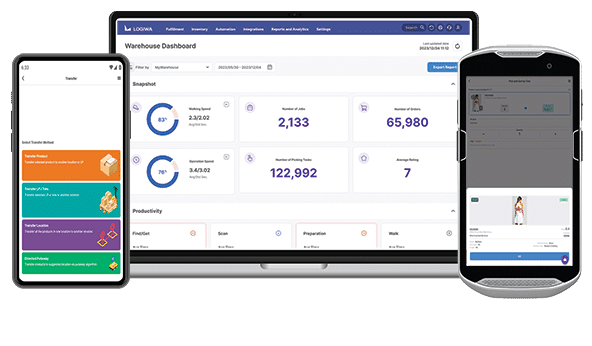Ask yourself:
Is your warehouse management software up to the task? Is it able to meet the ever-increasing needs of your ecommerce clients? Were you even aware that ecommerce WMS software existed?
If you answered no to any of the above, keep reading.
In this guide, we’ll be looking at:
What Is Ecommerce WMS Software?
Not all WMS software is created equally, and when it comes to serving ecommerce clients, you need a WMS that can help you meet their specific needs. Before we dive too far into the deep end of what ecommerce WMS software is, let’s quickly explore the difference between an ecommerce platform and ecommerce WMS software.
Simply put, brands and companies use ecommerce platforms to handle the marketing and sales of products and services. It’s the front-end of ecommerce sales—what customers see when they purchase items online. Examples of ecommerce platforms include Amazon, eBay, Shopify, and even Walmart.
On the other hand, ecommerce WMS software manages the back-end of ecommerce sales—inventory management and fulfillment. It tracks and manages how and where goods are physically kept and shipped to customers. .

How Can Ecommerce Benefit from WMS Software?
Have you ever placed an online order, only to find out afterward that the item you wanted was out of stock? This experience can affect customer satisfaction and result in lost sales if not appropriately managed. Anyone involved in online sales of goods can benefit from cloud WMS software because it can provide a single source of truth for all parties—your clients, their customers, and your warehouse business—to have real-time insight into the products you have on hand at all times.
Watch to learn more about how Logiwa can help your business: youtube
Using a WMS geared toward ecommerce clients can provide a return on investment in several ways:
-
- Allowing better inventory management, with the ability to accurately estimate current supply and avoid backorders, improving customer satisfaction
- Integrating with your enterprise resource planning (ERP) systems to gain accurate information about a product’s performance, product demand, and applicable seasonal demand changes
- Automating record-keeping and inventory analysis functions to improve workforce efficiency
- Managing workforce allocations more efficiently
Inventory tracking and accuracy
According to the 2020 National Retail Federation’s “National Retail Security Survey,” stock shortages cost businesses about $61.7 billion. Companies that use ecommerce WMS software can reduce or avoid stock shortages by providing up-to-date insight into how much inventory is stored, if you have too much or too little stock, or if any stock is expiring soon. Reducing out-of-stock and overstocked items can lower inventory counts by as much as 10%, resulting in lower space-related costs for warehouse operators.
Picking and packing efficiency
When customers order goods online, they want the item they receive to match their order. With good ecommerce WMS software, you can help your clients ensure their customers receive exactly what they ordered.
Many warehouses use a combination of manual and electronic tools to complete picking and packing processes. Humans aren’t perfect, and errors can occur. A web- or cloud-based WMS software can improve these processes by optimizing warehouse layout, creating smart picking algorithms, and giving employees access to real-time inventory for 100% order accuracy and exception creation.
Receiving and stowing/space management
In the warehouse business, space is money. Warehouse operators want to use their space efficiently to keep costs low. With ecommerce clients who need orders fulfilled quicker than ever, being wise in how you use your space is even more critical. When employees spend time searching for products, order shipments can be delayed, resulting in unhappy customers. An ecommerce WMS will allow you to analyze the space you have and the inventory you manage to help you maximize your space and use that space smartly.
Shipping
The demand for one-day shipping and same-day delivery is on the rise. Studies show that 97% of consumers consider same-day fast shipping, and 95% consider next-day shipping. To meet this increasing demand, you need precise information about shipping times and costs. An ecommerce WMS will integrate with popular shipping companies to provide the lowest shipping prices and the fastest delivery dates.
What Should You Look for in Ecommerce WMS Software?
If your clients are shifting their business to provide more ecommerce sales, or you want to expand your service offerings, it’s time to consider a WMS that can meet the needs of ecommerce businesses. What are some of the critical questions to consider when selecting a WMS?
-
- Can it be easily incorporated with other systems you currently use? This includes other enterprise resource planning systems to manage all resources, including human resources, sales and marketing, finance and accounting, tracking inventory, and customer relationship management.
- Is the system easy to use? Your WMS is only effective if your employees know how to use it properly. Ensure your WMS supplier provides training and ongoing support.
- Can the system identify and correct errors before they occur? Mistakes cost time and money. If you can prevent mistakes before they happen by having accurate information and real-time insight into your inventory, you can reduce errors and keep your clients and customers happy.
- Is it a cloud- or web-based system? Manual processes take a lot of time to complete and lead to errors. Cloud- or web-based WMS software can give you up-to-the-minute information about your warehouse on any device, no matter where you are. Even if you have multiple fulfillment centers, a cloud-based system will provide visibility into inventory in all your warehouses. This allows your customers to avoid overselling with synchronized inventory checks between all online sales channels and your fulfillment centers.
- An open API makes connecting your WMS with customers’ stores, custom websites, other warehouses, vendors, ERP, TMS, HR, or business intelligence systems easy. Push or pull any product, PO, order, shipment, customer, shipping label, or report data to or from your WMS for the most up-to-date and accurate information.
- Can it grow with your business? If you plan on future growth, you need a system that can grow with you. Save time and money with a WMS that can meet your organization’s needs now and in the future and with future market demands.
- Can it integrate with common and popular systems? A WMS is only as good as its integrations. Our ecommerce WMS software has pre-built integrations for popular ecommerce, online marketplaces, shipping, billing, and workforce management systems. And our Integrations Orchestrator makes creating, adding or customizing the perfect integration for you business seamless.
How to Choose the Best WMS for Your Operations
When choosing the best ecommerce WMS software for your operations, it’s important to start by asking what your warehouse teams need to do their jobs. Ask yourself and your team members the following questions:
-
- What do you need to accurately complete orders—picking, packing, and shipping?
- What current workflows or processes could be automated?
- What does your existing enterprise resource planning (ERP) system look like?
- What information do you need to make strategic warehousing and business decisions?
- How fast does data need to sync across the entire enterprise?
- How much time can you commit to training?
Ready to Better Serve Your Clients?
Logiwa’s WMS is the most ecommerce-friendly fulfillment platform for brands, online sellers, and third-party logistics providers who ship directly to consumers. It has been built specifically for high-volume business-to-consumer and direct-to-consumer businesses. Incorporating our WMS into your warehouse operations will allow you to serve your clients and customers better, improve your warehouse efficiency and accuracy, reduce costs, and increase profits.
If you are interested in learning more or want to see our ecommerce WMS software in action, contact our Sales team or request a demo.






